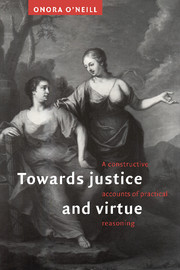Book contents
- Frontmatter
- Contents
- Preface
- Introduction
- 1 Overview: justice against virtue?
- 2 Practical reason: abstraction and construction
- 3 Focus: action, intelligibility and principles
- 4 Scope: agents and subjects: who counts?
- 5 Structure: obligations and rights
- 6 Content I: principles for all: towards justice
- 7 Content II: principles for all: towards virtue
- Bibliography
- Index
4 - Scope: agents and subjects: who counts?
Published online by Cambridge University Press: 05 June 2012
- Frontmatter
- Contents
- Preface
- Introduction
- 1 Overview: justice against virtue?
- 2 Practical reason: abstraction and construction
- 3 Focus: action, intelligibility and principles
- 4 Scope: agents and subjects: who counts?
- 5 Structure: obligations and rights
- 6 Content I: principles for all: towards justice
- 7 Content II: principles for all: towards virtue
- Bibliography
- Index
Summary
Universal practical principles neither impose wooden uniformity nor reduce to empty formalism. They are a vehicle and focus for much practical reasoning and for ethical and political life and discourse of many sorts. Nevertheless universalist practical reasoning will be of no use in thinking about justice or virtue unless there are also acceptable ways of fixing the scope, the structure and the content of ethically important principles. The first of these is surprisingly difficult.
Establishing the proper scope of practical principles is no trivial preliminary. On the contrary, tendentious ways of denying others' ethical standing or status, whether as agents or as subjects, may restrict the scope of ethical principles and may be used to support ways of life that effectively marginalize and oppress others by excluding them from the scope of others' ethical consideration. At various times status as agent or as subject (or both) has been denied or diminished for ‘barbarians’, for foreigner and foe, for heathen and heretic, for serfs and slaves, for those of other race or culture, for women, children and ‘dependents’, for animals and artificial persons. There may now be more agreement than there once used to be that all human beings are at least subjects of justice; but justification even of this limited agreement is insecure. Contemporary discussions in ethics and political philosophy remain full of smouldering and inconclusive wrangles about who should count as agent or as subject (alternatively: as (moral) person, as bearer of rights), hence about the proper scope of ethical consideration.
- Type
- Chapter
- Information
- Towards Justice and VirtueA Constructive Account of Practical Reasoning, pp. 91 - 121Publisher: Cambridge University PressPrint publication year: 1996



